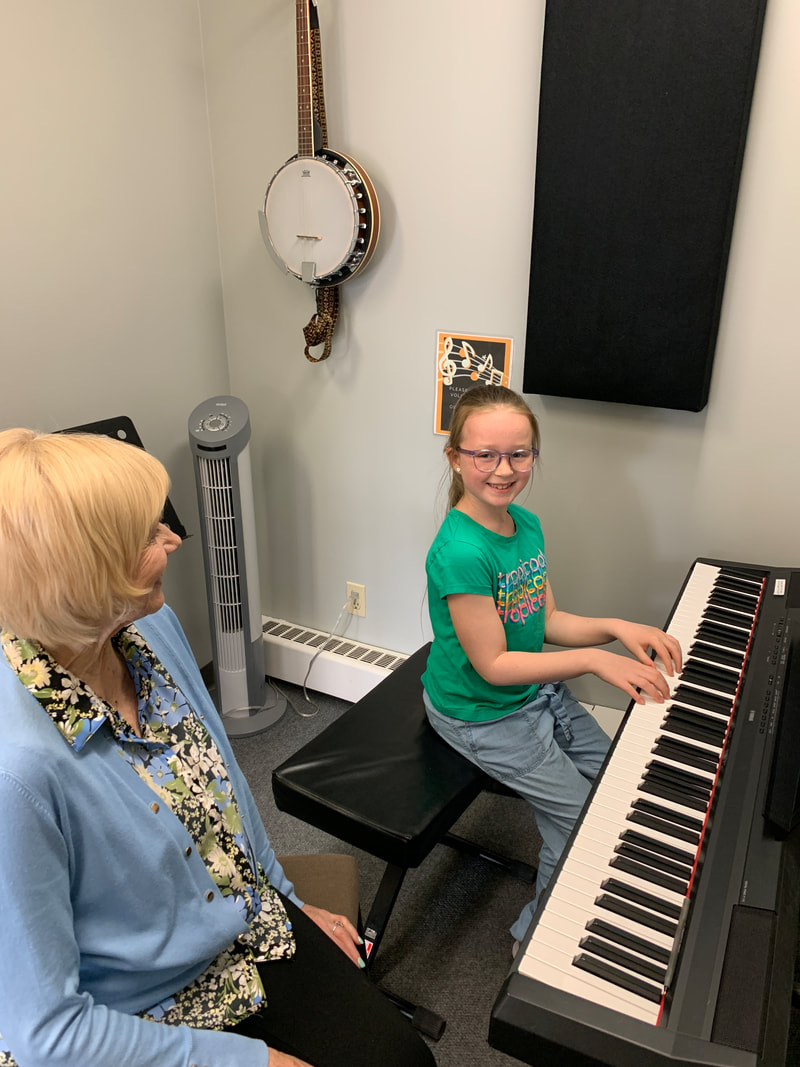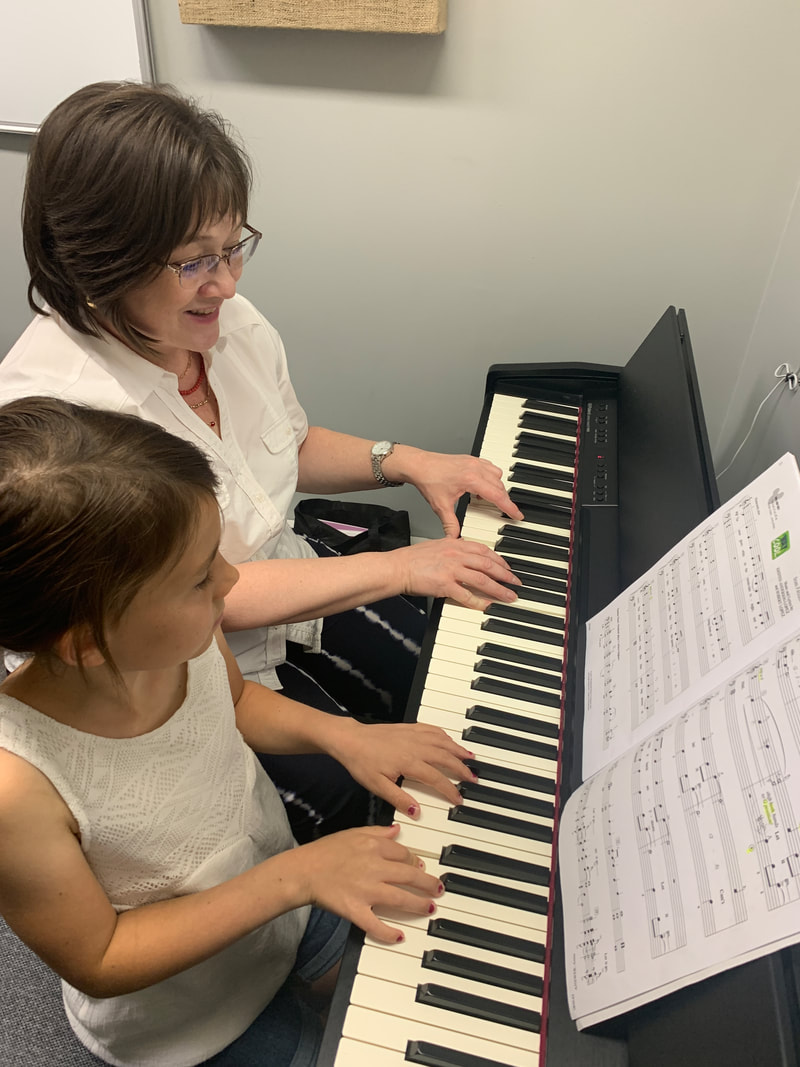|
Home | Hours & Directions
|
How To Get The Most Out of Your Lessons
(And Your Child To Practice)
The age-old struggle; “I can’t get my child to practice!” (Or sometimes, I can’t get myself to practice). Teachers hear it every week, parents get the daily argument that comes with it, and everyone who takes music lessons will one day regret not practicing more.
So the question is - what do we do about it? Do we quit or cancel lessons so we can avoid the discomfort altogether? Do we force our children to practice, risk daily fights and discourage musical futures? Do we let our students go with the flow and hope they pick it up independently?
I believe everybody has musical talent - as buried or seemingly non-existent as it may feel. It is not impossible! No matter your age, musical advantages, or previous exposure to music, there are none without hope!
So what do we do?
Let’s go through 5 methods that you can apply today to improve your practice and get results!
1. SET GOALS - Get your child (or yourself) to set a simple practice goal. The ideal practice situation is a little bit every day (or every day they’re able). If they love it - then a lot every day. And then help them stick to it. If they’re particularly stubborn about practicing, it might be because they haven’t gotten ‘the vision’ yet, which can take time. Start with one song, or even 5 minutes every day, and as they improve, they’ll get more excited. Sometimes, in teaching, a teacher may accidentally assign something too complex. Be open with your teachers; if a piece is too complicated and drains the enjoyment out of learning, don’t be afraid to ask for something less challenging (but, of course, a little challenge is always significant!). Many students take years to commit to a practice routine, but we can start working towards it now. Five minutes each day, or a few times a week, is MUCH better than zero!
2. PREPARE TO PERFORM! - Performing can be a scary thought. There’s a reason why more people in the world fear public speaking than people who fear dying! Our recitals are safe and fun! When practice has a purpose (such as acing the next recital!), then learning accelerates, and lessons become more meaningful. And that brings a lot of satisfaction.
3. LISTEN TO MUSIC - I can’t tell you how many students I get that come in excited to learn the guitar, piano, drums, or whatever, and when I ask what kind of music they like, they have no idea. So I ask what kind of music their parents enjoy, and they don't know! You don't have to know hundreds of bands and songs to learn music, but you need to know at least one song that you enjoy. Encourage yourself or your child to listen to music in their free time. Listen to music in the car or at home. Find songs you like and don’t like and make a list. With this info, your teacher will know exactly what to do to get you learning and having fun! This can include songs on the radio, movies, television shows, video games, or anywhere else you may find them!
4. PATIENCE - Some of us love music from day one, and some see lessons as a chore that must be done. Some concepts will be learned immediately in the lesson, and some things will take weeks or months to master. As a parent, be patient and supportive. Encourage the kind of practice we talked about in number 1. Emphasize accomplishments, encourage practice, and remember that music is a lifelong pursuit. People ask, “How long will it take to learn piano/guitar/ukulele/bass/singing/drums/violin/etc?” The answer is, “The rest of your life!” But we’ll take it one week at a time. I didn't start to take music and practice seriously until I had been learning for several years, and I'm so glad my parents didn't get rid of my guitars because I wasn't practicing for the first while!
5. AND FINALLY... BE PRESENT - That doesn’t necessarily mean sitting in on the lessons, although you can. That makes most kids pretty nervous. But be present in their musical education. I have seen many families bond over a shared love for music. Even if you know nothing at all, ask them about their lessons. Ask them what they’re enjoying, what’s difficult, what they’re learning, and what they hope to learn. It’s a simple conversation, but they're more likely to practice if you’re present in their education. They might even want to learn songs you like so they can play them for you! Talking about what we love without judgement is a massive self-affirmation of who we are, so be available for the musician in your life to share their learning with you.
In Conclusion...
These are just five simple tips that you can apply to your practice. Contrary to the belief of some, music is for EVERYONE. If we can set realistic and personalized goals, practice with an objective in mind, familiarize ourselves with what music is, have the patience that our hard work will ABSOLUTELY pay off, and then for parents - be present in the process, soon we will have a skill that we will carry through the rest of our lives. Music is an incredible thing. It isn’t easy! But it’s worth every second of practice.
The fact of the matter is - that we are all different. No two teachers teach the same, no two students learn the same, and no two musicians have the same experience. But the good news is that there are still universal truths that, if applied, followed, and adapted, you or your child will have a positive musical experience. One full of progress and joy!
The last tip is to work with your teacher - our teachers here are dedicated to creating musical geniuses and helping you love music. If you have questions or concerns or feel your instrument or teacher isn’t a good match for you, please talk to our office staff, and we’ll do our very best to help you find a teacher who will complement your learning style or an instrument that you will love, and get you moving forward!
GOOD LUCK!
James Zeck
Director of Lethbridge Music Academy
Life-Long Musician
So the question is - what do we do about it? Do we quit or cancel lessons so we can avoid the discomfort altogether? Do we force our children to practice, risk daily fights and discourage musical futures? Do we let our students go with the flow and hope they pick it up independently?
I believe everybody has musical talent - as buried or seemingly non-existent as it may feel. It is not impossible! No matter your age, musical advantages, or previous exposure to music, there are none without hope!
So what do we do?
Let’s go through 5 methods that you can apply today to improve your practice and get results!
1. SET GOALS - Get your child (or yourself) to set a simple practice goal. The ideal practice situation is a little bit every day (or every day they’re able). If they love it - then a lot every day. And then help them stick to it. If they’re particularly stubborn about practicing, it might be because they haven’t gotten ‘the vision’ yet, which can take time. Start with one song, or even 5 minutes every day, and as they improve, they’ll get more excited. Sometimes, in teaching, a teacher may accidentally assign something too complex. Be open with your teachers; if a piece is too complicated and drains the enjoyment out of learning, don’t be afraid to ask for something less challenging (but, of course, a little challenge is always significant!). Many students take years to commit to a practice routine, but we can start working towards it now. Five minutes each day, or a few times a week, is MUCH better than zero!
2. PREPARE TO PERFORM! - Performing can be a scary thought. There’s a reason why more people in the world fear public speaking than people who fear dying! Our recitals are safe and fun! When practice has a purpose (such as acing the next recital!), then learning accelerates, and lessons become more meaningful. And that brings a lot of satisfaction.
3. LISTEN TO MUSIC - I can’t tell you how many students I get that come in excited to learn the guitar, piano, drums, or whatever, and when I ask what kind of music they like, they have no idea. So I ask what kind of music their parents enjoy, and they don't know! You don't have to know hundreds of bands and songs to learn music, but you need to know at least one song that you enjoy. Encourage yourself or your child to listen to music in their free time. Listen to music in the car or at home. Find songs you like and don’t like and make a list. With this info, your teacher will know exactly what to do to get you learning and having fun! This can include songs on the radio, movies, television shows, video games, or anywhere else you may find them!
4. PATIENCE - Some of us love music from day one, and some see lessons as a chore that must be done. Some concepts will be learned immediately in the lesson, and some things will take weeks or months to master. As a parent, be patient and supportive. Encourage the kind of practice we talked about in number 1. Emphasize accomplishments, encourage practice, and remember that music is a lifelong pursuit. People ask, “How long will it take to learn piano/guitar/ukulele/bass/singing/drums/violin/etc?” The answer is, “The rest of your life!” But we’ll take it one week at a time. I didn't start to take music and practice seriously until I had been learning for several years, and I'm so glad my parents didn't get rid of my guitars because I wasn't practicing for the first while!
5. AND FINALLY... BE PRESENT - That doesn’t necessarily mean sitting in on the lessons, although you can. That makes most kids pretty nervous. But be present in their musical education. I have seen many families bond over a shared love for music. Even if you know nothing at all, ask them about their lessons. Ask them what they’re enjoying, what’s difficult, what they’re learning, and what they hope to learn. It’s a simple conversation, but they're more likely to practice if you’re present in their education. They might even want to learn songs you like so they can play them for you! Talking about what we love without judgement is a massive self-affirmation of who we are, so be available for the musician in your life to share their learning with you.
In Conclusion...
These are just five simple tips that you can apply to your practice. Contrary to the belief of some, music is for EVERYONE. If we can set realistic and personalized goals, practice with an objective in mind, familiarize ourselves with what music is, have the patience that our hard work will ABSOLUTELY pay off, and then for parents - be present in the process, soon we will have a skill that we will carry through the rest of our lives. Music is an incredible thing. It isn’t easy! But it’s worth every second of practice.
The fact of the matter is - that we are all different. No two teachers teach the same, no two students learn the same, and no two musicians have the same experience. But the good news is that there are still universal truths that, if applied, followed, and adapted, you or your child will have a positive musical experience. One full of progress and joy!
The last tip is to work with your teacher - our teachers here are dedicated to creating musical geniuses and helping you love music. If you have questions or concerns or feel your instrument or teacher isn’t a good match for you, please talk to our office staff, and we’ll do our very best to help you find a teacher who will complement your learning style or an instrument that you will love, and get you moving forward!
GOOD LUCK!
James Zeck
Director of Lethbridge Music Academy
Life-Long Musician







